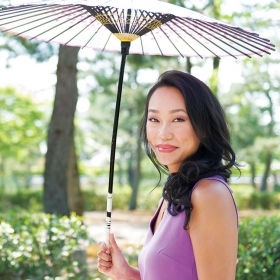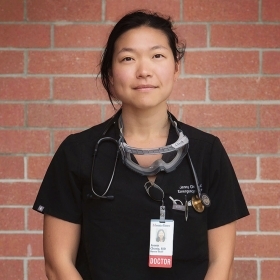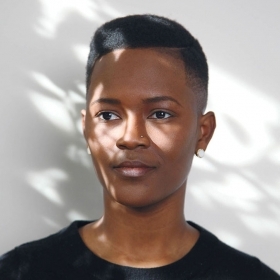Vicky Tsai ’00
“My dream for Tatcha … is to stay small in spirit as we grow in size. Our logo is made up of four hearts, which represent what we cherish: our clients, our craft, our colleagues, and our community. My job is to make sure we always remember this.”

Photo by Miki Chishaki
If you’re a fan of high-end skincare products, there’s a good chance that there’s a Tatcha item or two in your bathroom: perhaps a pot of The Water Cream, an anti-aging moisturizer, or a bottle of The Essence to soften your skin before you put on makeup. There’s a Wellesley woman behind the popular brand: Vicky Tsai ’00 created Tatcha in 2009, basing its products on ancient Japanese rituals. Last year, the multimillion-dollar company was sold to Unilever, which Vicky hopes will allow her brand to grow even more.
“Being a part of one of the largest [consumer packaged goods] companies in the world gives us the platform to be purpose driven, courageous, and creative, while also operating totally independently,” she says.
For Vicky, whose parents are originally from Taiwan, it is more than just about touting her products; it’s about authenticity and creating a true connection with her customers.
“We have big plans for Tatcha, which include going global,” she says. “My dream for Tatcha, though, is to stay small in spirit as we grow in size. Our logo is made up of four hearts, which represent what we cherish: our clients, our craft, our colleagues, and our community. My job is to make sure we always remember this.” The company is known for including handwritten letters to customers and attracting celebrities, including Meghan Markle and Kate Bosworth.
Vicky’s eye for business helped draw her to Wellesley. “I majored in economics because of Professor Chip Case’s book Principles of Microeconomics,” she says. “I read it for pleasure before Wellesley, and it just made sense to me. Understanding economics allowed me to understand the world around me in a different way that I found endlessly fascinating.”
She also loved the idea of being at a women’s college. “The greatest part of my Wellesley experience has been the community of remarkable Wellesley women,” she says. “Wellesley women have been my mentors, investors, and confidantes throughout my career, especially when I became an entrepreneur. Wellesley women have shown me not just the kind of professional I wanted to be when I grew up, but also the kind of person I aspire to be.”
After graduating, Vicky worked on Wall Street for Merrill Lynch before enrolling at Harvard Business School. After Harvard, she relocated to Seattle to work for Starbucks, launching its consumer products business in China.
During layovers in Japan, Vicky, who had acute dermatitis, was introduced to Japanese blotting papers known as aburatorigami. They helped control shine on her skin without irritating it. After quitting corporate life, she traveled to Japan to find the blotting papers, which led her to the geisha.
“They introduced me not only to traditional Japanese beauty rituals and ingredients that healed my skin but also to the Japanese culture of simplicity, purity, and mindfulness that healed my soul,” she says. “I was hooked and wanted to find a way to share all I had discovered.”
Vicky was so committed to her dream that she returned to the States and sold her engagement ring, house, and car to fund it, with support from her husband, Eric Bevan, the company’s co-founder. A few months later, they launched Tatcha on the same day Vicky gave birth to their daughter. She now splits her time between Japan and San Francisco, where she lives with her family.
Vicky has also launched Beautiful Faces, Beautiful Futures, a program through which every Tatcha product sold helps fund education for girls in Asia and Africa as part of a partnership with Room to Read.
“We chose girls’ education because the beauty industry can so often make women feel like their value is skin deep, and we wanted to help change that,” she says. “We believe beauty starts in the heart and the mind.”


